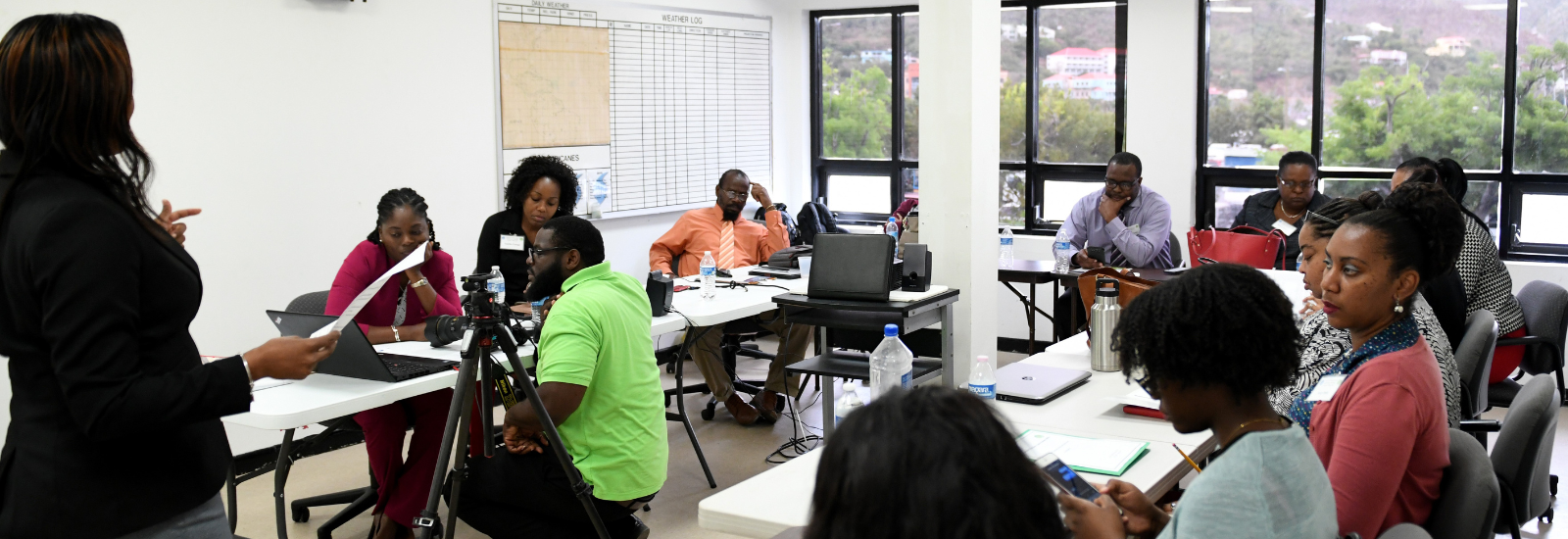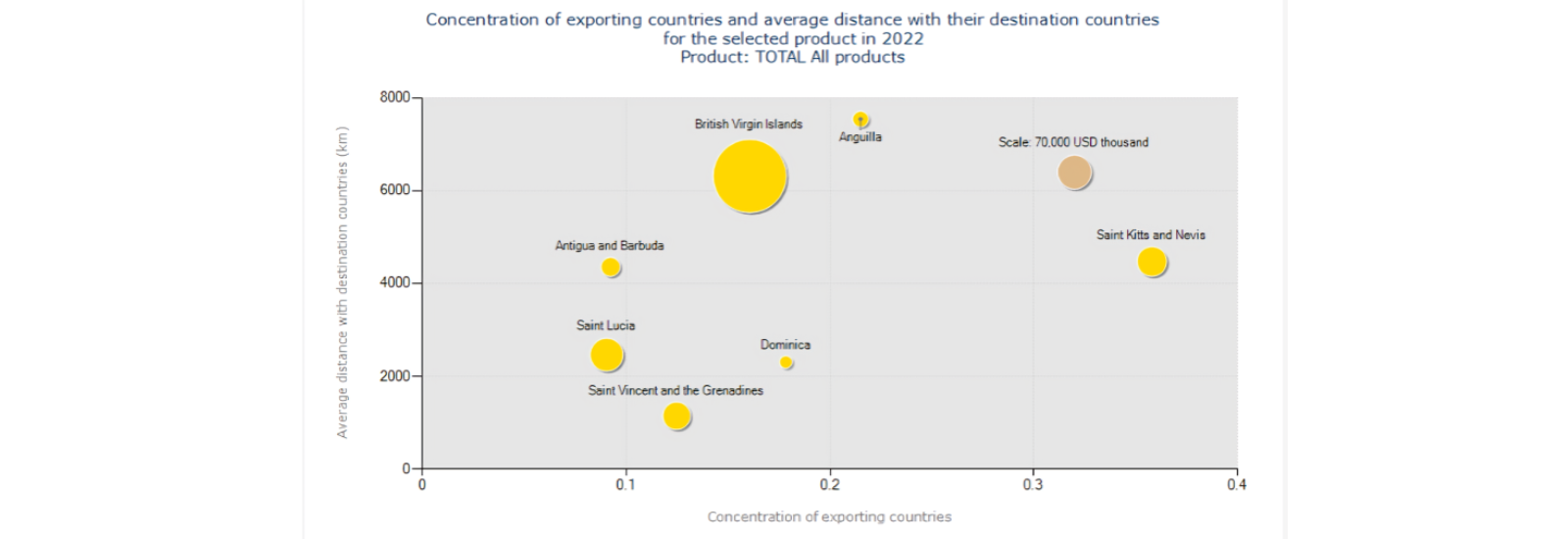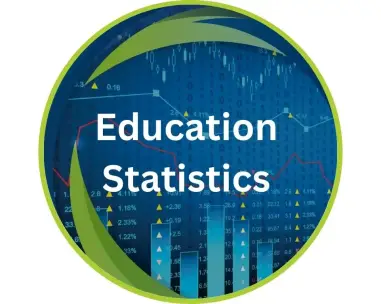Statistics in the Eastern Caribbean
Statistics in the Eastern Caribbean

Objectives
In the context of the Eastern Caribbean Economic Union, the availability of and access to high-quality country-comparable and actionable official statistics are imperative to inform, monitor and evaluate progress toward the attainment of full integration; and for realising equitable growth and development agenda. The Revised Treaty of Basseterre provides for the statistical development mandate in the Principal Article 4.2(s) In achieving the purposes of the Organisation the Member States shall implement decisions of the Organisation under this Treaty and otherwise endeavour to coordinate, harmonise and undertake joint actions and pursue joint policies particularly in the fields of –statistics;
The Statistical Services Unit leads five broad strategic priorities for statistical development as formulated in the OECS Regional Strategy for the Development of Statistics (RSDS) 2016 to 2030 based on an assessment of the national statistical systems. The OECS RSDS was launched in 2017 under the theme Revolutionising of Statistics, Developing our Societies. The strategic objectives and priorities that determine the statistical development initiatives and interventions are:
- Design and formalise the OECS Regional Statistical System (RSS)
- Consolidate and fortify national statistical systems;
- Join and respond to the data revolution;
- Extract insights and tell the stories;
- Trumpet and value official statistics.
Projects
Over the years, the OECS Commission has been supporting and/or leading several programmes designed to respond to the challenges of and opportunities for statistics in the Eastern Caribbean. The Commission has implemented several statistical development projects and the ones from 2016 include:
Enhanced Country Poverty Assessment Project (ECPA I) 2016 to 2020 [CDB];
Enhanced Country Poverty Assessment Project (ECPA II) 2024 to 2027 [CDB];
Data for Decision-Making (DDM) Project 2022 to 2027 [World Bank]
The following initiatives have been implemented and / or are currently being implemented by the OECS Commission:
- OECS Web-based Data Portal
- Design and formalise the OECS Regional Statistical System (RSS)
- Consolidate and fortify national statistical systems (NSS)
- Join and respond to the data revolution
- Extract insights and tell the stories
- Trumpet and value official statistics
1 - OECS Web-based Data

Click the Buttons to Learn More About the Platform

The OECS Web-based Data Dissemination Portal is the “one-stop-shop” for regional comparable data for the OECS Region. Datasets are also available at the country level. The Data Portal consists of seven (7) individual platforms. Click the question mark at the bottom of the page of each platform for more information.
The Portal was funded by the 11th European Development Fund for Regional Integration, Growth, Harmonisation and Technology (11th EDF RIGHT).
Datasets include:
- Social
- Economic
- Environmental
- Information and Communication Technology (ICT)
The Portal also visualises indicators by each Sustainable Development Goal (SDG).
![]() Click the Help icon for user guidelines, tutorials and tips on navigating the data portal.
Click the Help icon for user guidelines, tutorials and tips on navigating the data portal.
Geographical coverage includes:
All Protocol Member States of the OECS:
- Antigua and Barbuda
- Dominica
- Grenada
- Montserrat
- St. Kitts and Nevis
- Saint Lucia
- Saint Vincent and the Grenadines
Associate Members of the OECS:
The Overseas Territories (OTs) of Anguilla and the British Virgin Islands. The French-speaking territories of Guadeloupe and Martinique. Data collection for Saint Martin will commence shortly.
On-going Development
The Portal is supported by the Data for Decision-Making (DDM) Project and the Enhanced Country Poverty Assessment (eCPA) Project. It remains work in progress, with new data being progressively added by thematic areas. The OECS Commission invites all users to explore, engage with, and make use of this valuable resource as we continue to build a stronger foundation for informed decision making across the region.
2 - Design and Formalise the OECS Regional Statistical System (RSS)

This priority envisions a regional statistical system regulated by an apex authority for the development, production and dissemination of official statistics. It would require national statistical legislation to be updated and reference the Revised Treaty of Basseterre and incorporate the UN Fundamental Principles of Official Statistics; updated legislation should also include appropriate governance arrangements for oversight and accountability of the statistical development programmes.
3 - Consolidate and Fortify National Statistical Systems (NSS)

Strengthening the institutional, organisational and human capacity of the NSS is at the core of support provided by the OECS Commission. Without a strong operational foundation, the NSS constituents will be constrained in their ability to select, prioritise, produce and disseminate the harmonised, quality and comparable official statistics that are necessary for the development and integration agendas. This priority also embodies initiatives to produce statistical talent, enhance coordination between and among the actors in the NSS, improve statistical programming and budgeting and overall leadership and management. The following initiatives form part of the portfolio of support:
Supported improved data-sharing with Memoranda of Understanding (MOUs) (CDB ECPA)
Participated in Management and leadership training for NSO Heads; (Statistics Canada)
4 - Join and Respond to the Data Revolution

The aim of this priority is to cover the data requirements for all dimensions of regional integration and national development: economic, social, environmental and cultural. The approach entails undertaking regular censuses, surveys, and strengthening, leveraging and integrating administrative and other sources of data. The data revolution calls for exploring and exploiting the information technology more aggressively and innovatively than ever before. Modern ways of collecting/capturing/gathering, integrating, accessing and storing data are fundamental to this priority. Several development partners have worked with the Commission to deliver the following initiatives:
- Supported improved quality and comparability of economic data with the International Standard for Industrial Classification (ISIC) [UNSD];
Delivered general training in many cross-cutting topics to include, but not limited to, data anonymisation; using tablets to collect data; using qGIS; [World Bank; Statistics Canada; CDB ECPA I]
Delivered specific technical training to include but not limited to, producing business demography statistics [Statistics Canada];
Published the web-based OECS Population and Housing Census Toolkit [UNFPA];
Delivered IT equipment of software to include computers, laptops, servers [Statistics Canada; CDB ECPA I]
Designed the harmonised OECS Labour Force Survey Questionnaire [ILO, World Bank]
5 - Extract Insights and Tell the Stories
This strategic priority attends to data dissemination, visualisation, analysis and use. It calls for the statistical value chain to produce actionable data for a variety of users for multiple statistical purposes. Implementing the interventions for this priority includes actions to create partnerships for data visualisation and analysis. In so doing, the system can produce a variety of new knowledge, insights and ideas.
Delivered training for qGIS to visual data on maps [CDB ECPA I];
Delivered training for data analysis of poverty data [CDB ECPA I];
6 - Trumpet and Value Official Statistics

This strategic priority intends to reverse the vicious cycle of performance that plagues the system. The OECS Commission conceives advocacy as an entry point for elevating the profile of statistics, investment in statistics by governments, and erasing the perceptions, myths and phobias associated with data collection and use. Statisticians, their work and how it contributes to national development and regional integration will be celebrated and rewarded.
Established the OECS Statistical Communications and Advocacy Group [Statistics Canada];
Produced several videos to explain and promote participation in censuses and surveys [Statistics Canada];
Published a series of Stats in Focus magazines;
Coordinate annual observation of Caribbean Statistics Day;
Resources
Access more resources on Resources on Statistics In the Eastern Caribbean via the OECS Library.
Statistics Portal In The Eastern Caribbean

























